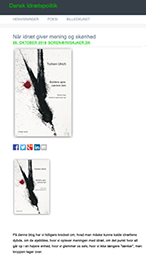| |
 |
 |
 |
 |
 (This is an unedited Google translation of "Når idræt giver mening og skønhed", a review by Søren Riiskjær of "Boldens øjne, værens ben: Notater langs idrættens spalte(n)de veje" ("Eyes of the Ball, Bones of Being: Notations along the divisive ways of athletics") that appeared in his blog, Dansk Idrætspolitik (Danish Sports Politics), Oct. 26, 2018.) To see the original blog post, click the image at left.) (This is an unedited Google translation of "Når idræt giver mening og skønhed", a review by Søren Riiskjær of "Boldens øjne, værens ben: Notater langs idrættens spalte(n)de veje" ("Eyes of the Ball, Bones of Being: Notations along the divisive ways of athletics") that appeared in his blog, Dansk Idrætspolitik (Danish Sports Politics), Oct. 26, 2018.) To see the original blog post, click the image at left.)
When sport makes sense and beauty
On this blog we have previously circled on what one might call the depth of sport, about the moments when we experience the meaning of sport, about the point where everything goes into unity where we forget ourselves where we no longer "Think", but the body takes over.
These moments can occur when the game combinations in football or handball dictate themselves and unseen patterns open up. When the duel in the tennis game develops as a "chase" in a jazz improvisation. When the tactical game in the bike race opens up, and the whole thing in itself ticks as the last pieces in a puzzle game. When the boat in the race becomes one with wind and power, and crew, trim and boat operation work by itself. When the lonely runner in the forest forgets the effort, the body finds its own rhythm, and a cohesion arises with the scent of the forest floor, the light falling between the leaves and the birds singing. When gymnastics shows up in a common organism as a rhythmic fusion of the many bodies.
Moments where it is not about records, victories or championships. Moments where sport opens other paths to joy - and perhaps insight.
Can we work with sports so that these moments do not just happen randomly, but in a way that is the "meaning" of the sport itself.
Torben Ulrich has tried to investigate these depths about someone. In connection with his 90th birthday, he has published a book in which he tries to summarize his long-life studies of sports as a form of cognition.
The book is made up of poems or so-called songlines in English on the left-hand sides and a continuous text in Danish on the right-hand sides.
At the immediate level, Torben Ulrich skinned in both text and songlines the sports authorities, sponsors, media hysteria and the implemented mercantilism that professional sports developed into. Ulrich criticizes the system that forces players into templates that are defined by and need to please the sponsors, thus wiping out any personality and individuality. In order to show their dedication to sponsors and media, players become obsolete manners that destroy the game.
On a slightly deeper level, Ulrich goes straight to the binary thinking of sport - he speaks of a binary. Everything is done in victories and defeats. Statistics and numbers are more important than the game than the interaction, rather than being together and being present.
Ulrich acknowledges that the binary thinking has a fascinating power and a value. But he insists that sport also includes other ways. The sport holds so much else. And it is this "other" that interests Ulrich - these other paths, which may have opportunities for another interaction, another insight.
Examining the game's space is central to Ulrich - "to see the game in its expanded dimension, its escape lines to the habitually interrupted, unexpected, immeasurable, immense, unpredictable, broader sense of living, existence, breath."
Many of his songlines begin with the phrase "when the ball comes". For what happens when the ball comes?
You can learn to master the ball or get in touch with the ball. Ulrich definitely prefers the last. To come "... meet the ball in a mood of friendship, passion, gratitude, in an understanding of the ball's presence, its dancing lanes, its whims, lines that give way to the wind, escape lines departing from their expected tracks ...". He is actually talking about composing a game as in the music, "... putting together escape lines, finding, inventing melodies, multiple rhythms ..." between the players. And he equates it with life lines "... between the ball and the co-players of the ball who, in an intense gathering, enriches the space, the scope, opens its field for adjacent areas ...". Interaction and presence are keywords. The game could be a game with the skin, not against each other.
In a songline, he asks a little scary, whether the reader may have ever considered taking part in the other team's cheering dance for a particularly beautiful goal.
The book has many readings.
It can be read as a philosophical work, a work about sports as a form of being.
It can be read as a practical training guide. Ulrich identifies five elements of sport: speed, strength, endurance, flexibility and coordination and connects them to the basic elements of earth, air, fire, water and space. Seeing these elements as a whole and working with the context in them can be clues in the practical training and in the game itself.
It can be read as a lyrical work. Ulrich plays with the language, examines it, speaks words and concepts and lets new ones emerge.
It can be read as a political input. French cultural theorist Augustin Girard has written in a cultural policy study that cultural policy is a struggle - a struggle to give more meaning and beauty to each of the moments of life. Torben Ulrich has always insisted that sport can give more meaning and more beauty. Thank you!
|
|








